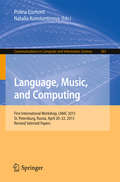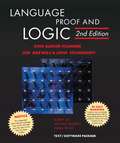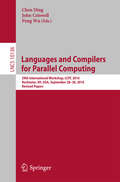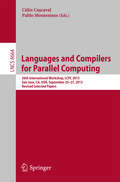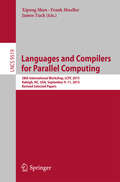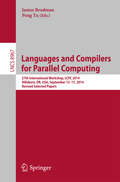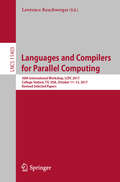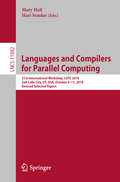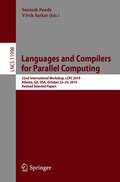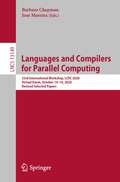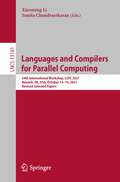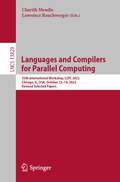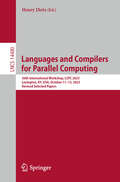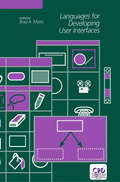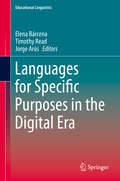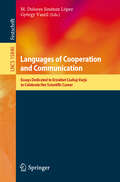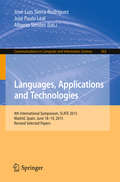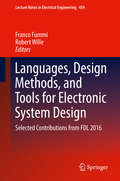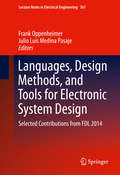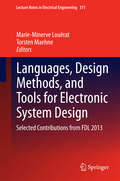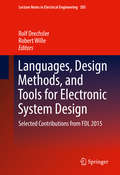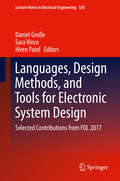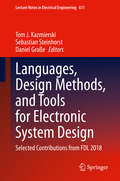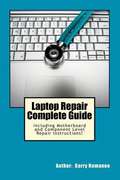- Table View
- List View
Language, Music, and Computing
by Polina Eismont Natalia KonstantinovaThis bookconstitutes the proceedings of the First International Workshop on Language,Music and Computing, LMAC 2015, held in St. Petersburg, Russia, in April 2015. The 13papers presented in this volume were carefully reviewed and selected from 38 submissions. They were organized in topical sections on music and language in education; corpus studies of language and music; problemsof notation; and linguistic studies of music.
Language, Proof and Logic 2nd Edition
by David Barker-Plummer Jon Barwise John EtchemendyThis book covers first-order language in a method appropriate for first and second courses in logic. It is designed to be used by undergraduates in philosophy, computer science, mathematics, and linguistics. Introductory material is presented in a systematic and accessible fashion. Advanced chapters include proofs of soundness and completeness for propositional and predicate logic, as well as an accessible sketch of Godel's first incompleteness theorem. The book is appropriate for a wide range of courses, from first logic courses for undergraduates (philosophy, mathematics, and computer science) to a first graduate logic course.
Language, Space and Mind
by Paul ChiltonThe idea that spatial cognition provides the foundation of linguistic meanings, even highly abstract meanings, has been put forward by a number of linguists in recent years. This book takes this proposal into new dimensions and develops a theoretical framework based on simple geometric principles. All speakers are conceptualisers who have a point of view both in a literal and in an abstract sense, choosing their perspective in space, time and the real world. The book examines the conceptualising properties of verbs, including tense, aspect, modality and transitivity, as well as the conceptual workings of grammatical constructions associated with counterfactuality, other minds and the expression of moral force. It makes links to the cognitive sciences throughout and concludes with a discussion of the relationship between language, brain and mind.
Languages and Compilers for Parallel Computing
by Peng Wu Chen Ding John CriswellThe 19th Workshop on Languages and Compilers for Parallel Computing was heldinNovember2006inNewOrleans, LouisianaUSA. Morethan40researchers from around the world gathered together to present their latest results and to exchange ideas on topics ranging from parallel programming models, code generation, compilationtechniques, paralleldatastructureandparallelexecution models, toregisterallocationandmemorymanagementinparallelenvironments. Out of the 49 paper submissions, the Program Committee, with the help of external reviewers, selected 24 papers for presentation at the workshop. Each paper had at least three reviews and was extensively discussed in the comm- tee meeting. The papers were presented in 30-minute sessions at the workshop. One of the selected papers, while still included in the proceedings, was not p- sented because of an unfortunate visa problem that prevented the authors from attending the workshop. We werefortunateto havetwooutstanding keynoteaddressesatLCPC2006, both from UC Berkeley. Kathy Yelick presented Compilation Techniques for Partitioned Global Address Space Languages. In this keynote she discussed the issues in developing programming models for large-scale parallel machines and clusters, and how PGAS languages compare to languages emerging from the DARPA HPCS program. She also presented compiler analysis and optimi- tion techniques developed in the context of UPC and Titanium source-to-source compilers for parallel program and communication optimizations. "
Languages and Compilers for Parallel Computing
by Călin Caşcaval Pablo MontesinosThis book constitutes the thoroughly refereed post-conference proceedings of the 26th International Workshop on Languages and Compilers for Parallel Computing, LCPC 2013, held in Tokyo, Japan, in September 2012. The 20 revised full papers and two keynote papers presented were carefully reviewed and selected from 44 submissions. The focus of the papers is on following topics: parallel programming models, compiler analysis techniques, parallel data structures and parallel execution models, to GPGPU and other heterogeneous execution models, code generation for power efficiency on mobile platforms, and debugging and fault tolerance for parallel systems.
Languages and Compilers for Parallel Computing
by Xipeng Shen Frank Mueller James TuckThisbook constitutes the thoroughly refereed post-conference proceedings of the 28thInternational Workshop on Languages and Compilers for Parallel Computing, LCPC2015, held in Raleigh, NC, USA, in September 2015. The19 revised full papers were carefully reviewed and selected from 44 submissions. The papers are organized in topical sections on programming models, optimizingframework, parallelizing compiler, communication and locality, parallelapplications and data structures, and correctness and reliability.
Languages and Compilers for Parallel Computing
by James Brodman Peng TuThis book constitutes the thoroughly refereed post-conference proceedings of the 27th International Workshop on Languages and Compilers for Parallel Computing, LCPC 2014, held in Hillsboro, OR, USA, in September 2014. The 25 revised full papers were carefully reviewed and selected from 39 submissions. The papers are organized in topical sections on accelerator programming; algorithms for parallelism; compilers; debugging; vectorization.
Languages and Compilers for Parallel Computing: 30th International Workshop, LCPC 2017, College Station, TX, USA, October 11–13, 2017, Revised Selected Papers (Lecture Notes in Computer Science #11403)
by Lawrence RauchwergerThis book constitutes the proceedings of the 30th International Workshop on Languages and Compilers for Parallel Computing, LCPC 2017, held in College Station, TX, USA, in October 2017. The 17 full papers presented together with abstracts of 5 keynote talks, 11 invited speakers and 4 poster papers in this volume were carefully reviewed and selected from 26 submissions. LCPC encourages submissions that go outside its original scope of scientific computing to diverse areas that are enable or enhanced by the power of parallel systems such as mobile computing, big data, relevant aspects of machine learning, data centers, cognitive computing, etc. LCPC strongly encourages personal interaction and technical discussions along the initial material.
Languages and Compilers for Parallel Computing: 31st International Workshop, LCPC 2018, Salt Lake City, UT, USA, October 9–11, 2018, Revised Selected Papers (Lecture Notes in Computer Science #11882)
by Mary Hall Hari SundarThis book constitutes the thoroughly refereed post-conference proceedings of the 31st International Workshop on Languages and Compilers for Parallel Computing, LCPC 2018, held in Salt Lake City, UT, USA, in October 2018. The 14 revised full papers were carefully reviewed and selected from 26 submissions. Specific topics are compiling for parallelism and parallel compilers, static, dynamic, and adaptive optimization of parallel programs, parallel programming models and languages, formal analysis and verification of parallel programs, parallel runtime systems and libraries, performance analysis and debugging tools for concurrency and parallelism, parallel algorithms and concurrent data structures, parallel applications, synchronization and concurrency control, software engineering for parallel programs, fault tolerance for parallel systems, and parallel programming and compiling for heterogeneous systems.
Languages and Compilers for Parallel Computing: 32nd International Workshop, LCPC 2019, Atlanta, GA, USA, October 22–24, 2019, Revised Selected Papers (Lecture Notes in Computer Science #11998)
by Santosh Pande Vivek SarkarThis book constitutes the thoroughly refereed post-conference proceedings of the 32nd International Workshop on Languages and Compilers for Parallel Computing, LCPC 2019, held in Atlanta, GA, USA, in October 2019.The 8 revised full papers and 3 revised short papers were carefully reviewed and selected from 17 submissions. The scope of the workshop includes advances in programming systems for current domains and platforms, e.g., scientific computing, batch/ streaming/ real-time data analytics, machine learning, cognitive computing, heterogeneous/ reconfigurable computing, mobile computing, cloud computing, IoT, as well as forward-looking computing domains such as analog and quantum computing.
Languages and Compilers for Parallel Computing: 33rd International Workshop, LCPC 2020, Virtual Event, October 14-16, 2020, Revised Selected Papers (Lecture Notes in Computer Science #13149)
by Barbara Chapman José MoreiraThis book constitutes the thoroughly refereed post-conference proceedings of the 33rd International Workshop on Languages and Compilers for Parallel Computing, LCPC 2020, held in Stony Brook, NY, USA, in October 2020. Due to COVID-19 pandemic the conference was held virtually. The 15 revised full papers were carefully reviewed and selected from 19 submissions. The contributions were organized in topical sections named as follows: Code and Data Transformations; OpenMP and Fortran; Domain Specific Compilation; Machine Language and Quantum Computing; Performance Analysis; Code Generation.
Languages and Compilers for Parallel Computing: 34th International Workshop, LCPC 2021, Newark, DE, USA, October 13–14, 2021, Revised Selected Papers (Lecture Notes in Computer Science #13181)
by Xiaoming Li Sunita ChandrasekaranThis book constitutes the thoroughly refereed post-conference proceedings of the 34th International Workshop on Languages and Compilers for Parallel Computing, LCPC 2020, held in Delaware, NE, USA, in October 2021.Due to COVID-19 pandemic the conference was held virtually. The 9 revised full papers were carefully reviewed and selected from 11 submissions. The conference covers all aspects of languages, compiler techniques, run-time environments, and compiler-related performance evaluation for parallel and high-performance computing. The scope of the workshop encompasses foundational results, as well as practical experience reports and bold new ideas for future systems.
Languages and Compilers for Parallel Computing: 35th International Workshop, LCPC 2022, Chicago, IL, USA, October 12–14, 2022, Revised Selected Papers (Lecture Notes in Computer Science #13829)
by Lawrence Rauchwerger Charith MendisThis book constitutes the thoroughly refereed post-conference proceedings of the 35th International Workshop on Languages and Compilers for Parallel Computing, LCPC 2022, held in Chicago, IL, USA, in October 2022. The 9 revised full papers were carefully reviewed and selected from 12 submissions. The conference covers all aspects of languages, compiler techniques, run-time environments, and compiler-related performance evaluation for parallel and high-performance computing. The scope of the workshop encompasses foundational results, as well as practical experience reports and bold new ideas for future systems.
Languages and Compilers for Parallel Computing: 36th International Workshop, LCPC 2023, Lexington, KY, USA, October 11–13, 2023, Revised Selected Papers (Lecture Notes in Computer Science #14480)
by Henry DietzThis volume LNCS 14480 constitutes the refereed proceedings of the International Workshop, LCPC 2023, in Lexington, KY, USA, held during October 2023. The 10 full papers presented together with 3 short papers were carefully reviewed and selected from 14 submissions. The conference focuses on mobile computing to big data and training of AI systems.
Languages for Developing User Interfaces
by Brad A. MyersThis book brings together a number of researchers and developers from industry and academia who report on their work. It is of interest to language designers and the creators of toolkits, UIMSs, and other user interface tools.
Languages for Specific Purposes in the Digital Era
by Elena Bárcena Timothy Read Jorge ArúsExplores the direct relation of modern CALL (Computer-Assisted Language Learning) to aspects of natural language processing for theoretical and practical applications, and worldwide demand for formal language education and training that focuses on restricted or specialized professional domains. Unique in its broad-based, state-of-the-art, coverage of current knowledge and research in the interrelated fields of computer-based learning and teaching and processing of specialized linguistic domains. The articles in this book offer insights on or analyses of the current state and future directions of many recent key concepts regarding the application of computers to natural languages, such as: authenticity, personalization, normalization, evaluation. Other articles present fundamental research on major techniques, strategies and methodologies that are currently the focus of international language research projects, both of a theoretical and an applied nature.
Languages of Cooperation and Communication: Essays Dedicated to Erzsébet Csuhaj-Varjú to Celebrate Her Scientific Career (Lecture Notes in Computer Science #15840)
by György Vaszil M. Dolores Jiménez LópezThis Festschrift is dedicated to Erzsébet Csuhaj-Varjú in recognition of her contributions to theoretical computer science. Over the course of her distinguished career, she has played a pivotal role in advancing the fields of formal languages, automata theory, and bioinspired computation. Her work as a research collaborator, mentor, and organizer has been instrumental in fostering a vibrant community, these successes are reflected in the papers contributed to this volume. Prof. Csuhaj-Varjú graduated with a master&’s degree in mathematics from the Kossuth Lajos University in Debrecen in 1977, she received her PhD in 1993, became a doctor of the Hungarian Academy of Sciences in 2003, and habilitated in computer science from Eötvös Loránd University. From 1979 to 2011 she was a researcher and manager at the Computer and Automation Research Institute of the Hungarian Academy of Sciences, she became a full professor at Eötvös Loránd University in 2008. Prof. Csuhaj-Varjú initiated research directions in the theory and applications of formal languages and automata, unconventional computation, and distributed systems, and played a decisive role in the development of the theory of grammar systems.
Languages, Applications and Technologies
by José-Luis Sierra-Rodríguez José-Paulo Leal Alberto SimõesThis bookconstitutes the refereed proceedings of the 4th International Symposium onLanguages, Applications and Technologies, SLATE 2015, held in Madrid, Spain, inJune 2015. The 17 revised full papers presented werecarefully reviewed and selected from 57 submissions. The papers are organizedin topical sections on human-human languages; human-computer languages; computer-computer languages.
Languages, Design Methods, and Tools for Electronic System Design
by Robert Wille Franco FummiThis book brings together a selection of the best papers from the nineteenth edition of the Forum on specification and Design Languages Conference (FDL), which took place on September 14-16, 2016, in Bremen, Germany. FDL is a well-established international forum devoted to dissemination of research results, practical experiences and new ideas in the application of specification, design and verification languages to the design, modeling and verification of integrated circuits, complex hardware/software embedded systems, and mixed-technology systems.
Languages, Design Methods, and Tools for Electronic System Design
by Frank Oppenheimer Julio Luis Medina PasajeThis book brings together a selection of the best papers from the seventeenth edition of the Forum on specification and Design Languages Conference (FDL), which took place on October 14-16, 2014, in Munich, Germany. FDL is a well-established international forum devoted to dissemination of research results, practical experiences and new ideas in the application of specification, design and verification languages to the design, modeling and verification of integrated circuits, complex hardware/software embedded systems, and mixed-technology systems.
Languages, Design Methods, and Tools for Electronic System Design
by Marie-Minerve Louërat Torsten MaehneThis book brings together a selection of the best papers from the sixteenth edition of the Forum on specification and Design Languages Conference (FDL), which was held in September 2013 in Paris, France. FDL is a well-established international forum devoted to dissemination of research results, practical experiences and new ideas in the application of specification, design and verification languages to the design, modeling and verification of integrated circuits, complex hardware/software embedded systems and mixed-technology systems.
Languages, Design Methods, and Tools for Electronic System Design
by Robert Wille Rolf DrechslerThisbook brings together a selection of the best papers from the eighteenth editionof the Forum on specification and Design Languages Conference (FDL), which tookplace on September 14-16, 2015, in Barcelona, Spain. FDL is a well-established international forumdevoted to dissemination of research results, practical experiences and newideas in the application of specification, design and verification languages tothe design, modeling and verification of integrated circuits, complexhardware/software embedded systems, and mixed-technology systems.
Languages, Design Methods, and Tools for Electronic System Design: Selected Contributions from FDL 2017 (Lecture Notes in Electrical Engineering #530)
by Daniel Große Sara Vinco Hiren PatelThis book brings together a selection of the best papers from the twentiethedition of the Forum on specification and Design Languages Conference (FDL), which took place on September 18-20, 2017, in Verona, Italy. FDL is a well-established international forum devoted to dissemination of research results, practical experiences and new ideas in the application of specification, design and verification languages to the design, modeling and verification of integrated circuits, complex hardware/software embedded systems, and mixed-technology systems.Covers modeling and verification methodologies targeting digital and analog systems;Addresses firmware development and validation;Targets both functional and non-functional properties;Includes descriptions of methods for reliable system design.
Languages, Design Methods, and Tools for Electronic System Design: Selected Contributions from FDL 2018 (Lecture Notes in Electrical Engineering #611)
by Daniel Große Tom J. Kazmierski Sebastian SteinhorstThis book brings together a selection of the best papers from the twenty-first edition of the Forum on specification and Design Languages Conference (FDL), which took place on September 10-12, 2018, in Munich, Germany. FDL is a well-established international forum devoted to dissemination of research results, practical experiences and new ideas in the application of specification, design and verification languages to the design, modeling and verification of integrated circuits, complex hardware/software embedded systems, and mixed-technology systems.Covers Assertion Based Design, Verification & Debug;Includes language-based modeling and design techniques for embedded systems;Covers design, modeling and verification of mixed physical domain and mixed signal systems that include significant analog parts in electrical and non-electrical domains;Includes formal and semi-formal system level design methods for complex embedded systems based on the Unified Modelling Language (UML) and Model Driven Engineering (MDE).
Laptop Repair Complete Guide; Including Motherboard Component Level Repair!
by Garry RomaneoThis book will educate you on the Correct Process of Repairing The Entire Laptop, Including and concentrating more on Motherboard Repair Instruction, Screen Repairing, Component Level Diagnosing and Repairing. This is the 3rd Book Released By Author Garry Romaneo, The Worlds Leading Laptop Repair Technician, Author, and Consultant. The book will take you through the laptops disassembly process, Explaining in detail how to disassemble all laptops. You will then be taught all about Liquid Spills to Laptops. What to do, What not to do, How to Remove Liquid and How To Repair Any Damage from Liquid to parts or components. You will be shown all the various tools to be used in laptop repair both hand tools and electronic tools explained. This book will then explain the entire upper end repairing techniques. Replacing screens - how to- then it will show you in great detail how to disassembly the screen and repair or replace the LCD ccfl Bulb, the book will also discuss LED screens. You will be taught step by step how to solder a motherboard whether it is the components or the dc jack. The DC Jack Repair/Desoldering instructions are included. Most importantly, this book will teach you laptop motherboard repairing techniques. Learn to identify the parts and components on the motherboard, learn component replacement, motherboard testing techniques and more. This book also includes the authors Patented/Copyrighted and Trademarked Laptop Video Chip/GPU Motherboard Online Repair instruction. There is alot more included (Part Identification, Hard Drive Failure Issues etc. . . )so check it out now. Going Above And Beyond CompTia A+ Certification !!!
